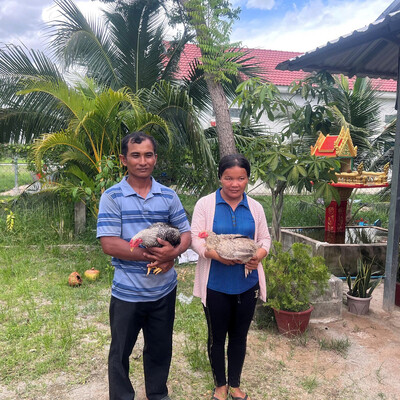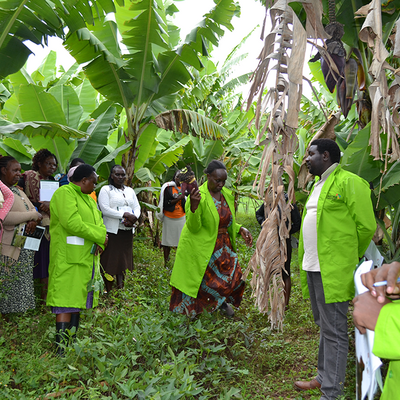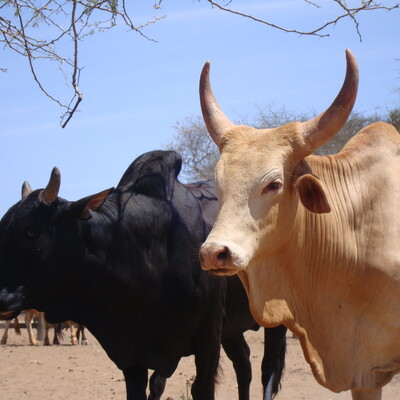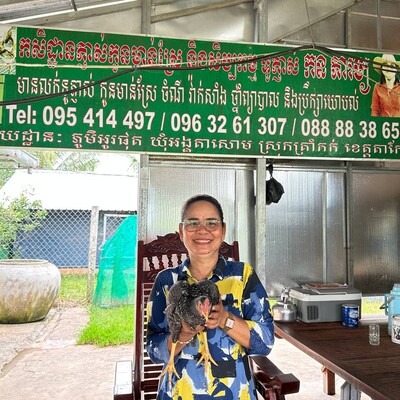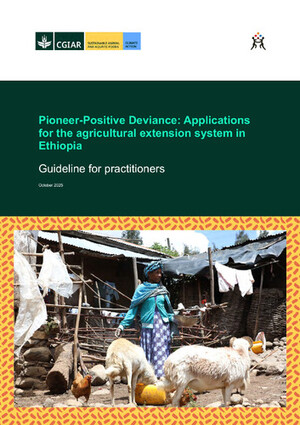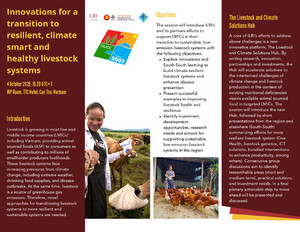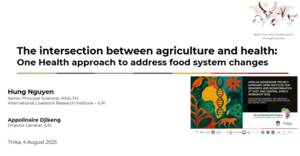
ILRI Board Chair Lindsay Falvey, 2019 Crawford Fund Medal awardee, calls on ‘NextGen’ researchers to complete the battle against hunger among the world’s poor

Lindsay Falvey, FTSE, FAIAS, who was presented with the 2019 Crawford Fund Medal during a special World Food Day event at the University of Melbourne on 16 Oct 2019 (photo credit: ILRI/Susan MacMillan).
Lindsay Falvey, chair of the board of trustees of the International Livestock Research Institute (ILRI), yesterday received the Crawford Fund Medal at a special World Food Day event held on 16 Oct 2019. Falvey then delivered a public lecture on the role of the next generation of scientists in finding solutions to global challenges.
This special World Food Day event was co-hosted by the Crawford Fund and the University of Melbourne’s Faculty of Veterinary and Agricultural Sciences.
Falvey was bestowed the 2019 Crawford Fund Medal for ‘remaining practically and passionately committed, for over four decades, to the international contributions agricultural science makes to food security.’
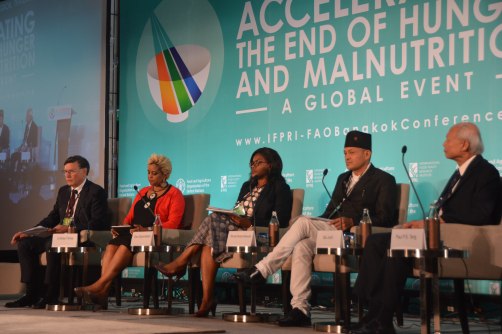
Lindsay Falvey (left) chairs a session at the IFPRI-FAO global conference on Accelerating the End of Hunger and Malnutrition, held in Bangkok in 2018 (photo credit: ILRI/Susan MacMillan).
In the words of the award committee, Lindsay Falvey conducted:
research combining technical, social, environmental, policy and historical research in the developing world, challenged the simple importing of agricultural technology [and] . . . demonstrated that indigenous knowledge and culture is critical to sustainability, food security and human development, thereby potentially benefitting millions of persons participating in international development projects.

In his public lecture, Falvey recounted some of the world’s agricultural successes and showed why engagement of the ‘nextgen’ and the university are so critical for finding lasting solutions to global challenges.
‘More than 30 per cent of the world was hungry in the 1960s;
today it’s around 15 per cent. Population has doubled in that time.The huge success of feeding an extra 3 billion people
ranks as one of humanity’s greatest feats.’—Lindsay Falvey
Falvey explained the central roles that agricultural science played in this success via ‘a wealth of innovative research for development conducted in diverse environments and cultures around the world.’
Australians can be proud, he said, for having been a consistent contributor to this major effort, including via international agricultural research centres—particularly those that form the CGIAR, a global research-for-development partnership working for a food-secure future.
Australians have been highly represented in these elite research centers since their beginnings in the 1960s.
Now, 50 years on, a new generation of agricultural scientists and thought leaders is needed to carry on this scientific and humanitarian work in the face of such complex and ‘wickedly’ inter-related problems as world poverty and hunger, global warming and mass migration.

Falvey began his lecture, which was part of the University of Melbourne’s Faculty of Veterinary and Agricultural Sciences’ 2019 Dean’s Lecture Series, by outlining the 50 years of successes of ‘integrated research for development’ made by international agricultural research groups, which helped to feed an extra three billion people over these five decades. Much of this effort, he said, was made by CGIAR, the world’s largest global agricultural innovation network. CGIAR’s 10,000 staff working in 96 countries, he said, bring evidence to policymakers, innovations to partners, and new tools to harness the economic, environmental and nutritional power of agriculture in developing countries.

This kind of integrated ‘R4D’, Falvey noted, has transformed lives and livelihoods, from China to South Asia, from the Sahel to South America.
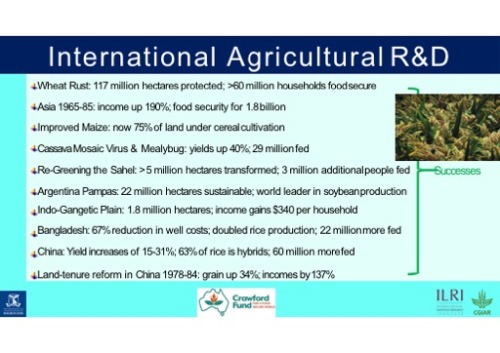
Among the examples Falvey provided was the eradication of rinderpest, a lethal and devastating animal disease last reported in Kenya in 2001. This scourge was declared ‘eradicated’ in 2011 and is only the second disease, after smallpox, to be eradicated from the Earth.
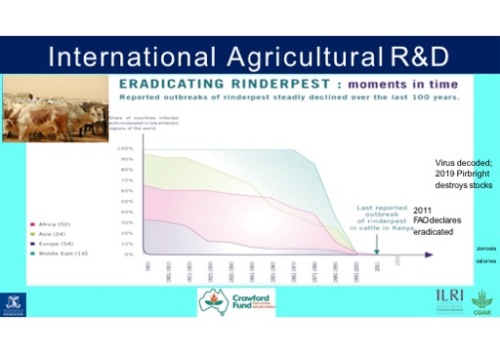
Lindsay also cited the reductions in the number of poor people in the world, due significantly to the products of international agricultural research over the years and the more recent rise in investments in agricultural research and development work in middle-income countries.
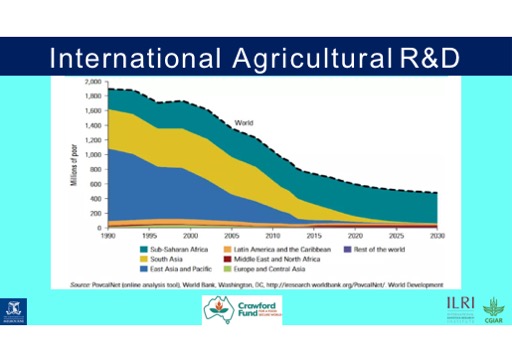
He said that diverse factors helped make this agricultural research for development work so well, but that one billion people remained malnourished.

He singled out two successes with wide impacts: adoption of an improved breed of tilapia fish—the ‘aquatic chicken’—in the Philippines and the introduction of a national milk grid and organization of dairy cooperatives in India, which is now the world’s largest dairy producer.
As to the importance of research to improve small-scale animal husbandry systems in general, Falvey highlighted not one but four major benefits of such research—better human nutrition, increased household incomes, improved adaptation to climate change, and the many regenerative aspects of mixed crop-and-livestock farming, an integrated, environmentally friendly, farming system that remains the mainstay of smallholder agriculture across the developing world today.

Regarding livestock’s nutritional benefits, Falvey singled out how much the consumption of milk, meat and eggs benefits pregnant and breastfeeding mothers and also their infants, from their conception to age two.

In conclusion, Falvey argued that the future of international agricultural research relies on a new generation of ‘intercultural integrationists’.

Lindsay Falvey is chair of the International Livestock Research Institute (ILRI), emeritus professor of the University of Melbourne, holds two adjunct appointments in Thai universities, is currently writing on the role of agricultural science in philosophy, and is the author of a biography of the Crawford Fund’s founding director, Derek Tribe.
View the whole of Lindsay Falvey’s presentation: ‘NextGen’ scientists needed to build on historic successes of agriculture R4D, 16 Oct 2019.
Read an opinion piece by Lindsay Falvey: Global challenges for the ‘NextGen’, Crawford Fund news webpage, 14 Oct 2019.
Read advertisement for this special World Food Day event, Lindsay Falvey’s public lecture at the University of Melbourne’s Faculty of Veterinary and Agricultural Sciences, on the University of Melbourne and Crawford Fund events webpages.






